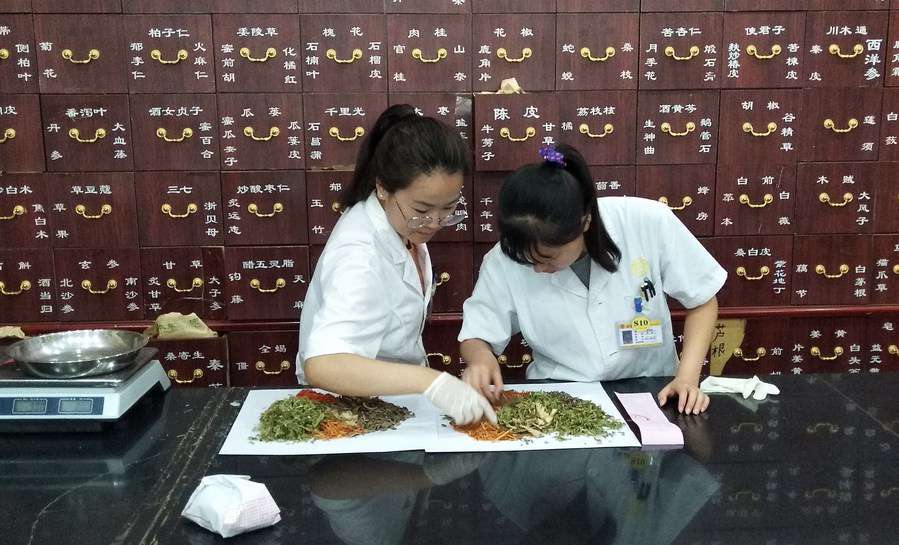


Photo taken with a mobile phone shows pharmacists preparing Chinese herbal medicine at a Chinese medicine store in Beijing, capital of China, July 31, 2019. (Xinhua/Zhang Chao)
Clinical data showed that Shufeng Jiedu capsules, added to standard antiviral therapy, significantly reduced the clinical recovery time of COVID-19 and fatigue as well as cough days, compared to standard antiviral therapy alone.
BERLIN, Nov. 8 (Xinhua) -- In a recently-published study, Chinese and German researchers have suggested that Shufeng Jiedu capsules, a patented herbal drug composed of eight medicinal plants, might be "a promising herbal therapy for moderate COVID-19."
The scientific paper was published online on Oct. 22 by Phytomedicine, a monthly peer-reviewed medical journal. The research team included Xia Lu of Shanghai Public Health Clinical Center affiliated to Fudan University, Shi Yujing of the China Academy of Chinese Medical Sciences, Su Jie of Shanghai Tech University, and Thomas Friedemann of HanseMerkur Center for Traditional Chinese Medicine at the University Medical Center in Germany.
There is currently no confirmed cure or vaccine for COVID-19. But the use of Traditional Chinese Herbal Medicine (TCM) to combat COVID-19 got international attention because it was regularly used during the pandemic, the authors said in the study. TCM was used successfully for the treatment of SARS in 2003 and influenza A (H1N1) in 2009, they said.
Shufeng Jiedu capsules, consisting of eight medicinal plants, are recognized for the treatment of different viral respiratory infectious diseases based on their antiviral, anti-inflammatory and immunomodulatory activities against acute lung injury, the authors said.
The antiviral and anti-inflammatory properties of Shufeng Jiedu capsules were confirmed by the mouse model. The decreased inflammatory factors in the lung tissue of coronavirus-infected mice can be explained by attenuation of pro-inflammatory pathways by bioactive compounds of the capsules, they said.
Network analysis showed that 11 inflammation and immunomodulation-related pathways were influenced by bioactive compounds of the capsules, they said.

CROATIA-KARLOVAC-COVID-19-PATIENTSA medical worker tends a COVID-19 patient at General Hospital Karlovac in Karlovac, Croatia, Oct. 28, 2020. (Kristina Stedul Fabac/Pixsell via Xinhua)
The authors had investigated data from a clinical pragmatic empirical study of patients diagnosed with COVID-19 to assess the clinical effectiveness of the capsules and to determine the optimal time to initiate treatment, according to the study.
Clinical data showed that Shufeng Jiedu capsules, added to standard antiviral therapy, significantly reduced the clinical recovery time of COVID-19 and fatigue as well as cough days, compared to standard antiviral therapy alone.
The herbal therapy was significantly more effective when used within the first eight days after the onset of COVID-19 symptoms, the authors said.
"Clinical data provided some promising evidence that the capsules might shorten the symptomatic course of COVID-19 in patients with mild and moderate symptoms. The results indicated that it is beneficial to administer the capsules immediately from the onset of the first symptoms," the authors said.
However, a large-scale randomized, double-blinded and placebo-controlled clinical trial is necessary to confirm the effect of this real-world study of Shufeng Jiedu capsules for the treatment of COVID-19 patients, they added.

Healthcare workers of Tebita Ambulance evacuate a patient from his residence onto an ambulance in Addis Ababa, capital of Ethiopia, on Oct. 13, 2020. (Xinhua/Michael Tewelde)

 Award-winning photos show poverty reduction achievements in NE China's Jilin province
Award-winning photos show poverty reduction achievements in NE China's Jilin province People dance to greet advent of New Year in Ameiqituo Town, Guizhou
People dance to greet advent of New Year in Ameiqituo Town, Guizhou Fire brigade in Shanghai holds group wedding
Fire brigade in Shanghai holds group wedding Tourists enjoy ice sculptures in Datan Town, north China
Tourists enjoy ice sculptures in Datan Town, north China Sunset scenery of Dayan Pagoda in Xi'an
Sunset scenery of Dayan Pagoda in Xi'an Tourists have fun at scenic spot in Nanlong Town, NW China
Tourists have fun at scenic spot in Nanlong Town, NW China Harbin attracts tourists by making best use of ice in winter
Harbin attracts tourists by making best use of ice in winter In pics: FIS Alpine Ski Women's World Cup Slalom
In pics: FIS Alpine Ski Women's World Cup Slalom Black-necked cranes rest at reservoir in Lhunzhub County, Lhasa
Black-necked cranes rest at reservoir in Lhunzhub County, Lhasa China's FAST telescope will be available to foreign scientists in April
China's FAST telescope will be available to foreign scientists in April